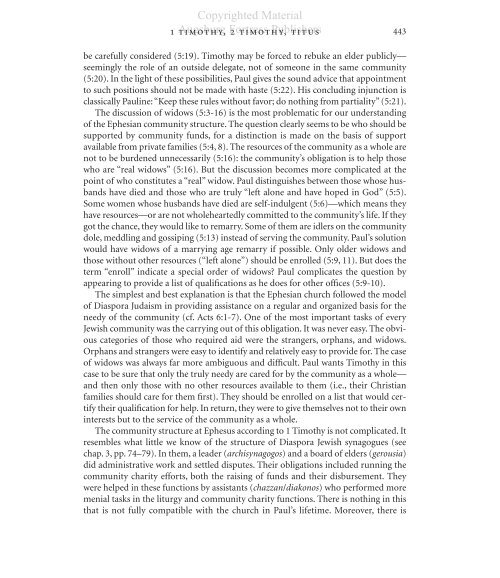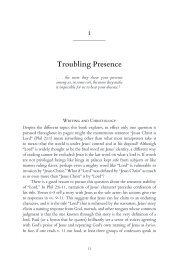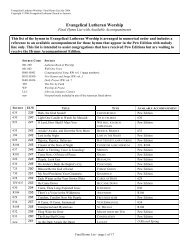19. Pastoral Letters: 1 Timothy, 2 Timothy, Titus - Augsburg Fortress
19. Pastoral Letters: 1 Timothy, 2 Timothy, Titus - Augsburg Fortress
19. Pastoral Letters: 1 Timothy, 2 Timothy, Titus - Augsburg Fortress
Create successful ePaper yourself
Turn your PDF publications into a flip-book with our unique Google optimized e-Paper software.
Copyrighted Material<br />
1 <strong>Augsburg</strong> timothy, <strong>Fortress</strong> 2 timothy, Publishers titus 443<br />
be carefully considered (5:19). <strong>Timothy</strong> may be forced to rebuke an elder publicly—<br />
seemingly the role of an outside delegate, not of someone in the same community<br />
(5:20). In the light of these possibilities, Paul gives the sound advice that appointment<br />
to such positions should not be made with haste (5:22). His concluding injunction is<br />
classically Pauline: “Keep these rules without favor; do nothing from partiality” (5:21).<br />
The discussion of widows (5:3-16) is the most problematic for our understanding<br />
of the Ephesian community structure. The question clearly seems to be who should be<br />
supported by community funds, for a distinction is made on the basis of support<br />
available from private families (5:4, 8). The resources of the community as a whole are<br />
not to be burdened unnecessarily (5:16): the community’s obligation is to help those<br />
who are “real widows” (5:16). But the discussion becomes more complicated at the<br />
point of who constitutes a “real” widow. Paul distinguishes between those whose husbands<br />
have died and those who are truly “left alone and have hoped in God” (5:5).<br />
Some women whose husbands have died are self-indulgent (5:6)—which means they<br />
have resources—or are not wholeheartedly committed to the community’s life. If they<br />
got the chance, they would like to remarry. Some of them are idlers on the community<br />
dole, meddling and gossiping (5:13) instead of serving the community. Paul’s solution<br />
would have widows of a marrying age remarry if possible. Only older widows and<br />
those without other resources (“left alone”) should be enrolled (5:9, 11). But does the<br />
term “enroll” indicate a special order of widows? Paul complicates the question by<br />
appearing to provide a list of qualifications as he does for other offices (5:9-10).<br />
The simplest and best explanation is that the Ephesian church followed the model<br />
of Diaspora Judaism in providing assistance on a regular and organized basis for the<br />
needy of the community (cf. Acts 6:1-7). One of the most important tasks of every<br />
Jewish community was the carrying out of this obligation. It was never easy. The obvious<br />
categories of those who required aid were the strangers, orphans, and widows.<br />
Orphans and strangers were easy to identify and relatively easy to provide for. The case<br />
of widows was always far more ambiguous and difficult. Paul wants <strong>Timothy</strong> in this<br />
case to be sure that only the truly needy are cared for by the community as a whole—<br />
and then only those with no other resources available to them (i.e., their Christian<br />
families should care for them first). They should be enrolled on a list that would certify<br />
their qualification for help. In return, they were to give themselves not to their own<br />
interests but to the service of the community as a whole.<br />
The community structure at Ephesus according to 1 <strong>Timothy</strong> is not complicated. It<br />
resembles what little we know of the structure of Diaspora Jewish synagogues (see<br />
chap. 3, pp. 74–79). In them, a leader (archisynagogos) and a board of elders (gerousia)<br />
did administrative work and settled disputes. Their obligations included running the<br />
community charity efforts, both the raising of funds and their disbursement. They<br />
were helped in these functions by assistants (chazzan/diakonos) who performed more<br />
menial tasks in the liturgy and community charity functions. There is nothing in this<br />
that is not fully compatible with the church in Paul’s lifetime. Moreover, there is




